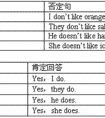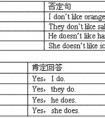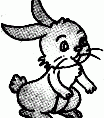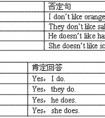按要求完成下列各句。1. Thisisabook.(变否定句)abook.2. Heisagoodboy.(变为一般疑问句)goodboy?3.Thecanteenisonthefirstfloor.(用Where提问)the ?-四年级英语
当动词“think”、“believe”、“suppose”、“imagine”、“expect”、“feel”的主语是第一人称,谓语动词为没有任何副词修饰的一般现在时,它们的否定式实际上是对宾语从句的否定。
表示说话者提出一种委婉的看法或主张。如:
I think that he will help us.——I don’t think that he will help us. 我认为它不会帮助我们。
I believe that he is right.——I don’t believe that he is right. 我认为他不对。
I suppose that he likes it.——I don’t suppose that he likes it. 我想他不喜欢它。
2. 形式上否定谓语动词,实际上否定复合宾语
当动词“think”、“believe”、“suppose”、“imagine”、“expect”、“feel”、“find”的主语是第一人称,谓语动词为没有任何副词修饰的一般现在时,它们前面的否定式实际上是对复合宾语的否定。表示说话者所提出的一种委婉的看法或主张。如:
I think math difficult. — I don’t think math difficult. 我认为数学不难。
I find the story interesting. — I don’t find the story interesting. 我认为这个故事没有趣。
I expect so. —I don’t expect so. 我认为不会。
二、动词“think”、“believe”、“suppose”、“imagine”、“expect”、“feel”在下列情况下,否定不转移:
1.这些动词跟其他另一个动词一起做并列谓语时,否定不转移。如:
I believe and hope he won’t do that. 我相信并且也希望他将不会那样做。
I feel and admit that we are not foolish. 我觉得并且也承认我们并不愚蠢。
2.用于疑问句时,否定不转移。如:
Do you think it is not going to rain? 你认为天不会下雨吗?
Don’t you believe that he has done a good thing? 难道你不相信他做了一件好事?
3.用作插入语时,否定不转移。如:
Li Lei, I think, won’t be angry with you. 我想李蕾不会生你的气。
Tom, I suppose, won’t be against it. 我猜想汤姆不会反对。
Mike, I believe, hasn’t seen the film. 我认为迈克没有看这场电影。
4.动词前有其他副词修饰时,否定不转移。如:
I really don’t think it’s necessary for us to go there now. 我的确不认为我们有必要去那儿。
I feel strongly that he shouldn’t do such a thing. 我强烈地认为他不应该做那样的事。
5.动词为非一般现在时或主语不是第一人称时,否定不转移。
I thought that he wouldn’t come back soon. 我原以为他不会回来得这么快。
She didn’t believe that he became a good boy. 她不相信它变成了一个好孩子。
He thinks that he isn’t fit for the job. 他认为他不适合这件工作。
He doesn’t believe that what we told him is true. 他不相信我们告诉他的事是真的。
6.当宾语从句中含的否定为“not……at all”、“not a little”、“not a few”、“not enough”、“can’t help”等固定搭配时,否定不转移。如:
I think that he doesn’t know it at all. 我想他对那一点也不知道。
I suppose that it is not enough to remember the words if you want to learn the language well. 我认为如果你想把这门语言学好,那么只记单词是不够的。
I believe that you can’t help singing our national anthem when you win the first place in the Olympic Games. 我相信当你在奥运会上获得第一名时你会情不自禁地唱起国歌来。
7.当宾语从句中含“no”、“nothing”、“nobody”、“nowhere”、“hardly”、“seldom”、“little”、“few”等否定词或半否词时,否定不转移。如:
I believe that nothing can make me give it up. 我想任何事情也不能使我放弃。
I think that no one can escape if the ship sinks in the sea. 我认为如果这艘船沉入海底的话,那么谁也逃不掉。
I suppose that he is a man of few words. 我猜想他是一个言语不多的人。
考点名称:特殊疑问句
- 特殊疑问句:
以特殊疑问词开头,对句中某一成分提问的句子叫特殊疑问句。
常用的疑问词有:what、who、whose、which、when、where、how、why等。
特殊疑问句往往是就其中的某一成分,进行提问,而且根据情况直接回答,不能用yes或no简单回答。
常见的疑问代词有who, whose, which, what;疑问副词有when, where, why, how。
例:What do you do on Sunday? 你周日的时候干什么?
Which class are you in? 你在哪个班?
Where does Mr. Li live? 李先生住在哪?
Why are you late? 你为什么迟到? 特殊疑问句的构成:
一、 特殊的疑问词。
特殊疑问句要由疑问代词或疑问副词开头,询问的内容不同, 使用的疑问词也不同。
我们学过的疑问词有:
what(询问事物), how much(询问价格),what time (询问时间,尤其是点钟), what kind of(询问种类),why(询问原因),who(询问人), where(询问地点) 等等。如:
—What is this? 这是什么?
—It's a key. 这是一把钥匙。
—How much is it? 这个多少钱?
—It's twenty dollars. 二十美元。
—What kind of movies do you like? 你喜欢哪一类型的电影?
—I like action movies. 我喜欢动作片。
二、特殊的语序。
特殊疑问句由疑问词开头,其构成是“疑问词 + 一般疑问句”。如:
What time is it? 现在几点钟?
Who is your teacher? 谁是你的老师?
三、特殊的答语。
特殊疑问句不能用yes, no来回答,而应根据它所询问的内容直接做出回答才行。如:
— What time is it, please? 请问几点了?
— It's 7:30. 七点半了。
— Where are they? 他们在哪儿?
—They're in the playground. 他们在操场上。
—What's your favorite subject? 你最喜爱的科目是什么?
—English. 英语。
四、 特殊的语调。
一般情况下,特殊疑问句要用降调(↘)来读。如:
Who's ↘that?
How old is↘Jack?特殊疑问句有两种语序:
1.如疑问词作主语或主语的定语,即对主语或主语的定语提问,其语序是陈述句的语序:
Who is singing in the room﹖
whose bike is broken﹖
2.如疑问词作其他成分,即对其他成分提问,其语序是:
特殊疑问词+一般疑问句【特殊疑问词+be/助动词/情态动词+主语+谓语】
What does she like?
What class are you in﹖
Where are you from﹖
What time does he get up every morning﹖
How do you know﹖- 就划线部分提问的基本方法:
小学对特殊疑问句的考查主要采取对划线句子提问的方式,那么在句型转换就划线部分提问的基本方法是:
先根据划线部分词语的意思和句法功能确定用什么疑问词;
然后将原句变为一般疑问句跟在疑问词的后面即可(注意去掉划线部分)。
基本构成:疑问词+一般疑问句
A、对“物”划线用What。
This is an orange. → What is this?
We can see a cat under the desk. → What can you see under the desk?
B、对“地点”划线用Where,如果“地点”作定语时,用Which后跟被修饰的那个名词。
He is under the tree. → Where is he?
Jenny is in the classroom. → Where is Jenny?
C、对“年龄”划线用How old。
Miss Li is twenty-three. → How old is Miss Li?
My sister is five years old. → How old is your sister?
D、对“颜色”划线,用What colour。
Her sweater is red. → What colour is her sweater?
E、对“可数名词的数量”划线用How many +复数名词。
She has one red coat. → How many red coats does she have?
I have six books. → How many books do you have?
F、对“不可数名词的数量”划线用How much+不可数名词。
I want to buy three kilos of meat. →How much meat do you want to buy?
G、对“职业”划线用What。
She is a driver. → What is she?
My father is a farmer. → What is your father?
H、对“星期几”划线用What day。
It's Sunday today. → What day is it today?
I、对“时间”划线用What time。
We go to school at seven in the morning. → What time do you go to school in the morning?
It is five o’clock now. → What time is it?
- 最新内容
- 相关内容
- 网友推荐
- 图文推荐
| [家长教育] 孩子为什么会和父母感情疏离? (2019-07-14) |
| [教师分享] 给远方姐姐的一封信 (2018-11-07) |
| [教师分享] 伸缩门 (2018-11-07) |
| [教师分享] 回家乡 (2018-11-07) |
| [教师分享] 是风味也是人间 (2018-11-07) |
| [教师分享] 一句格言的启示 (2018-11-07) |
| [教师分享] 无规矩不成方圆 (2018-11-07) |
| [教师分享] 第十届全国教育名家论坛有感(二) (2018-11-07) |
| [教师分享] 贪玩的小狗 (2018-11-07) |
| [教师分享] 未命名文章 (2018-11-07) |





![____ it got four wheels?[ ]A. Have B. There C. Has-五年级英语](http://www.00-edu.com/d/file/ks/4/1/65/2019-08-31/small2ca0aeba76320ba6f81e40fe83a0e8111567199443.png)
